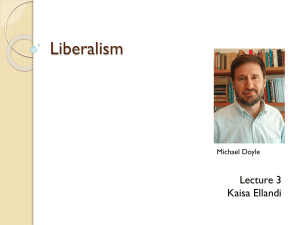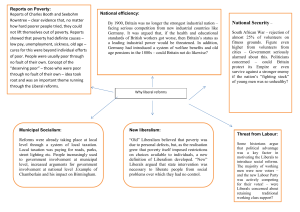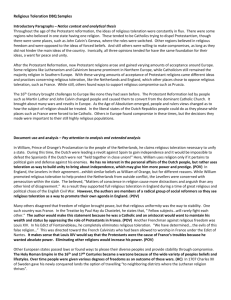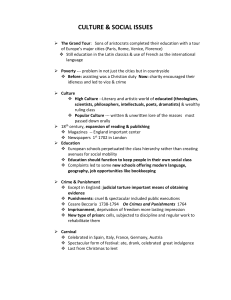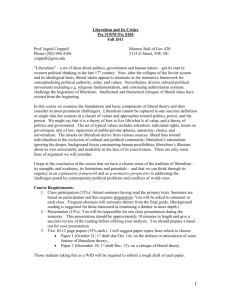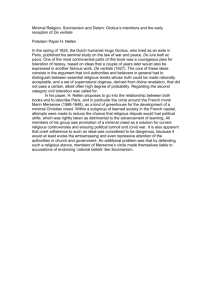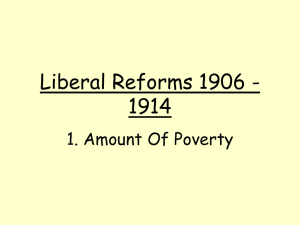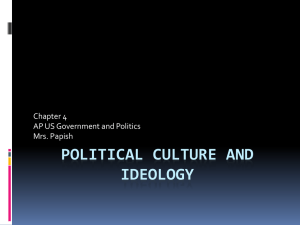LIBERALISM, TOLERATION AND DIVERSITY
advertisement
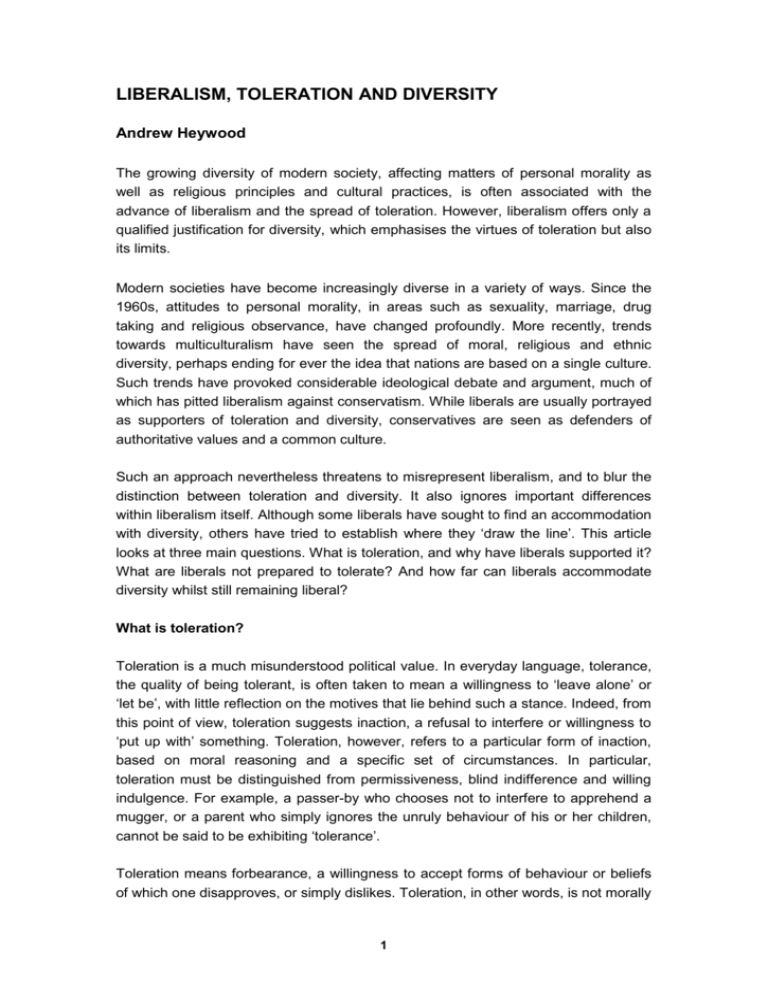
LIBERALISM, TOLERATION AND DIVERSITY Andrew Heywood The growing diversity of modern society, affecting matters of personal morality as well as religious principles and cultural practices, is often associated with the advance of liberalism and the spread of toleration. However, liberalism offers only a qualified justification for diversity, which emphasises the virtues of toleration but also its limits. Modern societies have become increasingly diverse in a variety of ways. Since the 1960s, attitudes to personal morality, in areas such as sexuality, marriage, drug taking and religious observance, have changed profoundly. More recently, trends towards multiculturalism have seen the spread of moral, religious and ethnic diversity, perhaps ending for ever the idea that nations are based on a single culture. Such trends have provoked considerable ideological debate and argument, much of which has pitted liberalism against conservatism. While liberals are usually portrayed as supporters of toleration and diversity, conservatives are seen as defenders of authoritative values and a common culture. Such an approach nevertheless threatens to misrepresent liberalism, and to blur the distinction between toleration and diversity. It also ignores important differences within liberalism itself. Although some liberals have sought to find an accommodation with diversity, others have tried to establish where they ‘draw the line’. This article looks at three main questions. What is toleration, and why have liberals supported it? What are liberals not prepared to tolerate? And how far can liberals accommodate diversity whilst still remaining liberal? What is toleration? Toleration is a much misunderstood political value. In everyday language, tolerance, the quality of being tolerant, is often taken to mean a willingness to ‘leave alone’ or ‘let be’, with little reflection on the motives that lie behind such a stance. Indeed, from this point of view, toleration suggests inaction, a refusal to interfere or willingness to ‘put up with’ something. Toleration, however, refers to a particular form of inaction, based on moral reasoning and a specific set of circumstances. In particular, toleration must be distinguished from permissiveness, blind indifference and willing indulgence. For example, a passer-by who chooses not to interfere to apprehend a mugger, or a parent who simply ignores the unruly behaviour of his or her children, cannot be said to be exhibiting ‘tolerance’. Toleration means forbearance, a willingness to accept forms of behaviour or beliefs of which one disapproves, or simply dislikes. Toleration, in other words, is not morally 1 neutral; it only applies in circumstances where there is disagreement with the views or actions of others but a deliberate refusal to act to prevent them. The French writer Voltaire memorably expressed such a position in declaring: ‘I detest what you say but will defend to the death your right to say it’. Tolerance is therefore a principled unwillingness to impose one’s views on others, when there is a clear capacity to do so. A battered woman, for instance, who stays with her abusive partner out of fear can hardly be said to tolerate his behaviour. On the other hand, this leads to what has been called the ‘paradox of toleration’: the fact that it allows people to think or act in ways that are thought to be immoral, or in some way undesirable. If something is ‘wrong’, surely it should be stopped. Critics of toleration therefore often present it as a failure of moral consciousness, even a cowardly refusal to stand up for what one believes in. Liberals, needless to say, reject this criticism, arguing that they do stand up for what they believe in, and what they believe in is toleration. But why? Some key liberal thinkers John Locke (1632-1704) – An English philosopher and politician, Locke championed the cornerstone liberal idea that government arises out of the agreement, or consent, of the governed, outlined in the theory of the social contract. In this view, the central purpose of government is to protect God-given, natural rights – for Locke, the rights to life, liberty and property. John Stuart Mill (1806-73) – A British philosopher, economist and politician, Mill constructed a form of liberalism that was based squarely on the virtues of liberty and the conception of ‘man as a progressive being’. He straddled the classical and modern liberal tradition, in opposing interventionism but also stressing the importance of individuality and personal development. Isaiah Berlin (1909-97) – A Riga-born, UK historian of ideas and philosopher, Berlin developed a form of pluralist liberalism that was based on the anti-perfectionist belief that conflicts of value are an intrinsic, irremovable element in human life. Political arrangements should therefore aim to allow the greatest scope for people to pursue their differing ends. John Rawls (1921-2002) – A US political philosopher, Rawls developed a theory of ‘justice as fairness’ that not only condemned racial, sexual and religious discrimination, but also rejected many forms of social and economic inequality. His egalitarian form of liberalism has made a profound contribution to both the modern liberal and social democratic political traditions. Justifying toleration 2 Within liberal ideology, toleration has been justified in at least three different ways: The earliest case for toleration was based on rationalism. Such arguments can be traced back to seventeenth-century justifications for religious toleration, as advanced by writers such as John Milton and John Locke. Although Locke put forward a number of arguments in favour of toleration, his central belief was that ‘truth’ will only emerge out of free competition amongst ideas and beliefs, and must therefore be left to ‘shift for herself’. Religious truth can only be established by the individual for himself or herself; it cannot be taught, and it should not be imposed by government. Rational individuals should therefore be left to decide their own beliefs and determine their own actions. This position is further upheld by the liberal assumption that most forms of intolerance spring from ignorance and social prejudice. Liberals, for instance, tend to dismiss racial intolerance (e.g. anti-Semitism), sexual intolerance (e.g. sexism and homophobia) and religious intolerance (e.g. Islamophobia) as simple examples of bigotry. Intolerance therefore usually crumbles in the face of rational analysis. The second, and classic, basis for toleration is autonomy, the vision of human beings as independent and self-determining creatures. This view was expressed in perhaps the most famous defence of toleration, J.S. Mill’s On Liberty ([1859] 1972). For Mill, autonomy was an essential condition for any form of personal or moral development. It therefore followed that intolerance, restricting the range of individual choice, can only debase and corrupt the individual. This encouraged Mill to develop what became as known as the ‘harm principle’: the belief that individual freedom can be rightfully constrained only in order to prevent ‘harm to others’. Mill was particularly fearful of the threat to autonomy that was posed by the spread of democracy and what he called the ‘despotism of custom’. He warned that the power of majority opinion would promote ‘dull conformity’ and encourage individuals to submit their rational faculties to the popular prejudices of the day. As a result, he extolled the virtues of individuality (emphasising the uniqueness of the human individual) and even eccentricity. The third justification for toleration is that it benefits society as well as the individual. This view can also be traced back to Mill. For Mill, the virtue of moral, cultural and political diversity is that it ensures that all theories will be ‘tested’ in free competition against rival ideas and doctrines. If society is to progress, good ideas have to displace bad ones; truth has to conquer falsehood. Nevertheless, as with other liberals, Mill accepted that debate, discussion and argument would be continuous because no final or absolute truth can ever be established. The intellectual development and moral health of society therefore demand the scrupulous maintenance of toleration to ensure a ‘free market of ideas’. 3 Limits of toleration But how far does liberal toleration extend? Where do liberals ‘draw the line’? Toleration only provides a limited and specific justification for diversity. This can be seen in at least three different ways: The most basic limit on toleration is that it extends only to views, values and social practices that are themselves tolerant; that is, ideas and actions that are compatible with individual freedom and autonomy. It is difficult for liberals to tolerate intolerant views and actions because, at heart, they believe these are ‘wrong’. Mill, for example, spoke out against the Chinese practice of binding women’s feet. This also means that liberals cannot accommodate the ‘deep diversity’ advocated by some multiculturalists. For instance, liberals may be unwilling to endorse practices such as female circumcision, forced (and possible arranged) marriages and female dress codes, however much the groups concerned may argue that these are crucial to the maintenance of their cultural identity. More generally, the emphasis on autonomy means that liberals will usually place individual rights above the (alleged) rights of cultural, religious or ethnic groups. This especially applies when there are doubts about whether group membership is voluntary. Liberals are certainly concerned about obstacles that may prevent members from leaving a group (particularly when punishment is threatened), but they have also been critical of the indoctrination of children and restrictions on members’ access to rival views and alternative lifestyles (toleration, after all, benefits society precisely because it promotes intellectual and cultural ‘mixing’). The second basis for limiting toleration is to uphold a bedrock of shared civic allegiances and political values. Unlike conservatives, liberals do not assume that societies are only stable if they are based on shared values and a common culture. However, liberals will often insist that moral and cultural diversity should be confined to ‘private’ life and not be allowed to intrude into the ‘public’ sphere. In that way, they see moral and cultural diversity operating within the context of a shared citizenship. This is why many liberals reacted critically to the idea, raised by the Archbishop of Canterbury in February 2008, that the operation Shari’a courts alongside formal court processes in the UK should be regarded as unavoidable. For liberals, such a move would weaken the civic and legal identity of society. Liberals would typically argue that, if Shari’a courts are to be accepted in the UK, they should be clearly subordinate to the formal court system and comply with other legal provisions, notably the Human Rights Act. The third basis for toleration to be constrained is that liberal democracy is taken to be the sole legitimate political system. Its virtue is that it alone ensures that 4 government is based on the consent of the people, and that it provides guarantees for personal freedom and toleration. Liberals may therefore be willing to ban fascist or militant fundamentalist groups that aspire to overthrow liberal democracy in the name of a single source of unchallengeable authority. In practice, liberals may be reluctant to impose such bans for fear that the groups concerned may go underground and become stronger, but such a position is based on pragmatism rather than principle and is not a manifestation of toleration. Liberalism and pluralism However, particularly since the 1970s, liberal thinkers have sought ways of embracing wider diversity. This has usually involved attempts to demonstrate that liberalism is neutral, in that it somehow stands above moral debate and argument. From this perspective, liberalism is not simply an ideology but a ‘meta-ideology’; that is, a body of rules that lays down the grounds on which political and ideological debate can take place. Such a stance of neutrality has been upheld in two main ways. One of these is the belief that liberalism gives priority to ‘the right’ over ‘the good’, as argued by the John Rawls (1970). In the view of Rawls, liberalism strives to establish the conditions in which people in groups can pursue the good life as each defines it (‘the right’), but it does not prescribe or try to promote any particular values or moral beliefs (‘the good’). This, then, enables liberalism to coexist with a wide diversity of political, moral and cultural beliefs. The alternative argument in favour of neutrality is based on the idea of value pluralism, which is associated most clearly with the Isaiah Berlin. Value pluralism suggests, in short, that people are bound to disagree about the ultimate ends of life, as it is not possible to demonstrate the superiority of one moral system over another. As values conflict, the human predicament is inevitably characterised by moral conflict. In this view, liberal beliefs, such as support for autonomy, toleration and democracy, have no greater moral authority than illiberal or intolerant beliefs. Such a position goes beyond toleration in holding that society should be based on the principle of ‘live and let live’, or what is sometimes called the politics of indifference. What is pluralism? Pluralism, in its broadest sense, is a belief in or commitment to diversity or multiplicity, the existence of many things. As a descriptive term, pluralism may denote the existence of party competition (political pluralism), a multiplicity of ethical values (moral or value pluralism), a variety of cultural beliefs (cultural pluralism) and so on. As a normative term, it suggests that diversity is healthy and desirable, usually because it safeguards individual liberty and promotes debate, argument and understanding. More narrowly, the term pluralism is used as a theory of the 5 distribution of political power. As such, it holds that power is widely and evenly dispersed in society, not concentrated in the hands of an elite or ruling class. Can liberalism be neutral? Attempts to reconcile liberalism with pluralism run into problems over the idea of moral neutrality. Can liberals really stand above moral debate and argument and remain liberal? Liberalism is not, and can never be, a philosophy of ‘do your own thing’. While liberalism undoubtedly favours openness, debate and selfdetermination, it is also characterised by a powerful moral thrust. Rawls, for example, recognised this arguing that differences within society had to take place within an ‘overlapping consensus’, on what citizens can agree despite the other matters that divided them. At the heart of this consensus are the values of autonomy, freedom and equality, values that Rawls believed it was ‘unreasonable’ to challenge or reject. The same applies to Berlin, who remained a liberal to the extent that he believed that it is only within a society that respects individual liberty can value pluralism be contained. However, one of the problems with his work was that he failed to demonstrate how liberal and illiberal beliefs can co-exist harmoniously within the same society. The simple fact is that once liberalism accepts value pluralism, it is difficult to contain it within a liberal framework. This is where liberalism and pluralism depart. For liberals, diversity is endorsed but only when it is construed within a framework of toleration and personal autonomy. Pluralists, on the other hand, refuse to ‘absolutise’ liberalism, according liberal and illiberal ideas equal status. John Gray (1995) therefore argued that pluralism implies a ‘post-liberal’ stance, in which liberal values, institutions and regimes are no longer seen to enjoy a monopoly of legitimacy. Liberalism is thus ‘relativised’. Not only do liberalism and pluralism offer different approaches to diversity, but the rivalry between them has become one of the central ideological battlegrounds in modern societies. References and further reading Gray, J. (1996) Post-liberalism: Studies in Political Thought, Routledge. Heywood, A. (2004) Political Theory: An Introduction, Palgrave Macmillan King, P. (1998) Toleration, Frank Cass. Locke, J. (1963) A Letter Concerning Toleration, Martinus Nijhoff Mendus, S. (1989) Toleration and the Limits of Liberalism, Macmillan. Mill, J. S. (1972) Utilitarianism, on Liberty and Considerations on Representative Government, Dent. Rawls, J. (1970) A Theory of Justice, Oxford University Press. Swift, A. (2001) Political Philosophy, Polity. 6
